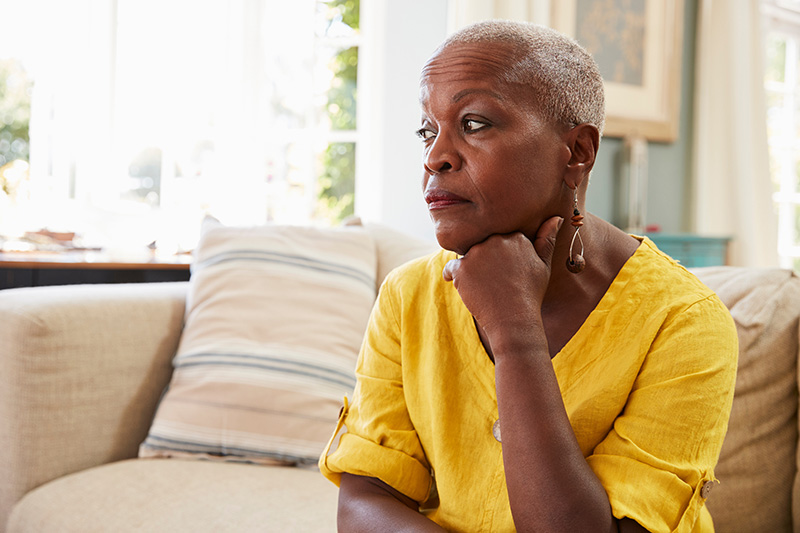Something that we as a community have yet to fully turn our attention to is the question of “how do we help our autistic elders thrive and live in dignity as they age?”

As a late-diagnosed autistic woman, I am a pretty good example of what growing up and growing old without any particular support looks like. Nearly all of the late-diagnosed women that I know are in similar shape: two mistakes away from dire poverty and facing escalating health issues while our earning power is declining.
The numbers back me up: according to the Social Security Administration,” 17.3 percent of nonmarried elderly women (widowed, divorced, or never married) are living in poverty today.” And that figure doesn’t take disability into account.
According to American Progress, in March of this year, “In 2022, 26.2 percent of disabled women lived in poverty compared with 10.7 percent of nondisabled women and 21.6 percent of disabled men.”
That 26.2% is a vast increase over the already appalling 17.3% for unmarried women. I am an unmarried disabled woman in my 50s, and I am mildly concerned.
I’m only speaking for myself, but I know that my story echoes that of so many other adult autistic women my age. We struggled. We struggle. Our late diagnosis gave the struggle a name and a framework but did not lessen the struggle materially or socially. It’s only by talking about so many of the things that embarrass me, that have similarly embarrassed others, that we can draw attention to the areas where we and younger late-diagnosed autistic women will need more intentional support.
Growing up in the wild and wooly 70s, my autism and ADHD were never diagnosed. Similarly, growing up in the 1930s and 40s, my parents’ neurodiversity, now blazingly apparent, also went undiagnosed. The thing about growing up in a cluster of ND folks is that your neurodiversity doesn’t necessarily stand out. Mine stood out only due to my failure to be good at being a girl- that was the focus of “fixing me” at school and at home. Things would be fine if I were just more demure, more mindful….
I wasn’t, and none of those things helped. What that strategy did was guarantee that I would feel awkward and burdened with shame about simply existing, both around my family and everyone else, to this day. I moved away from home as soon as possible despite not having any resources or knowing much about how the world outside of school worked. For example, I literally did not know that people paid money for their utilities. However, if I hadn’t left home then, I never would have made the leap.
I had no idea of how to advocate for myself, or what was just treatment, or what behavior I shouldn’t tolerate. My mother was so infuriated that I didn’t plan to move back home after college that she punished me by taking the little bit of money I had squirreled away from my last student loan disbursement, hoping to prevent me from going by taking away the means I had acquired to set myself up. I felt that I deserved such treatment because I was disappointing and disobeying my mother, and as someone who was just inherently wrong, I had no right to expect better. It took me years and a lot of grief to pay that small loan off, and I never really stabilized from that precarity until my 30s, which in turn made me feel even more ashamed and awkward.
I never lost the sense of shame that was laced through everything, the never-receding feeling of not deserving to be where I was, that I shouldn’t be there. I never recovered from the sense that I should hide all these shameful mistakes I made as a young person growing into the world without adequate guidance and support.
With a lot of work, it has dwindled to a mostly-managed background hum instead of constant daggers in the place where my neck meets my shoulders. It was with me, though, all the times I didn’t ask for a raise, all the times I let others take credit for my thoughts, all the times I should have spoken up in meetings and my words failed me. It was with me when I settled in relationships, agreed to less because there would be less friction, put up with things I shouldn’t have.
As a dreamy teen raised by undiagnosed autistics who had more or less fallen into teaching, the idea of really having a think about what I might like to do for a living was never really presented to me. If it had been presented, it would have been a moot point: I didn’t understand why people did anything that they did, and all of the things I was interested in doing weren’t allowed, so the idea of thinking about what I might “like” to do was a non-starter. I expected to just fall into something as my parents had. I expected the great, inscrutable system that everyone else understood would simply issue me an appropriate job at some point.
I did well in school, and though I didn’t understand it at the time due to low self-esteem, I could have gone to almost any school. I wanted to stay home and become a carpenter but capitulated to applying to at least one school. Once I was accepted, my parents stopped pretending that college was my choice: I was going. It wound up being a great choice, firstly, it got me away from home. I came into my own in a variety of ways. However, I still didn’t really understand the “why” of it, and I came from a family that valued education as personal enrichment, not job preparation. Like I said, undiagnosed autistic.
I had also spent most of my life being simply unable to breathe. Except for my intelligence, there was almost nothing my parents seemed to like about me, and they didn’t even know the full truth of it. I wasn’t deferential to my father the way girls were supposed to be, I wasn’t ladylike by any stretch of the imagination, I wanted friends, but the other girls did boring things, and it was frowned upon for me to play with the boys. I questioned everything and came to my own conclusions. I wasn’t intentionally defiant, but so much of what I was supposed to do was patently stupid or went against my grain (holler back to having no idea why people did what they did.) I realized in my teen years that this was all meant to train me away from being gay because I was clearly a very tiny lesbian from day one, and every effort was made by the world around me to stifle that. So yeah, getting away from home was really good for me, but the distraction of just surviving in my own skin, combined with autistic naivety, meant that I just took any old job after college. I figured they were all pretty much the same since people seemed to have no real reasons (to me) for anything that they did. I’d do something white-collar because that’s what my parents told me to do. It wasn’t what I wanted to do, so how could one be different from the other? Anything I experienced as satisfying work wasn’t available to me, and most of the other things I was good at didn’t make money.
Mix executive dysfunction into the fly-by-the-seat-of-your-pants and I-don’t know-how-anything-in-the-world-works cocktail, and you have the perfect recipe for poverty and precarity. Oh, and let’s not forget time blindness- even when I earned sufficiently, I would foul things up by confusing which day or month it was, pay heavy fines for lateness, and generally mess everything up. These problems weren’t solved until after my diagnosis. Now, I have a “Daily Money Manager” who prevents me from forgetting November entirely, a small savings account, and multiple reliable income streams. What I’ve learned is that money is like time- you’ve got to build redundancy into your system because there are no guarantees.
Now in my 50s, I have no children, am still wildly uncomfortable around most of my family, and all of my autistic women friends are in the same boat. The particular mix of precarity, health problems, and persistent drive for autonomy to preserve dignity that are sidecars to my own personal autism means that at some time in the not-too-distant future, I will have significant difficulty getting around, but I won’t suffer the humiliation of asking for help after a lifetime of feeling rejected. I’ve worked since I was 14, but I don’t have much put away for retirement. I foolishly invested what I did have in a house flip that was ruined by a divorce. I am extremely uncomfortable in group settings, yet I will inevitably wind up in some sort of subsidized elder care that will be both a sensory nightmare for me and deprive me of the solitude I need in order to feel alright.
The idea of being dependent on carers, around strangers, and in any sort of communal living is absolutely intolerable to me, but that’s where I will end up.
Johanna R. Murphy, MFA, works as Director of Development for Evolve Coaching. For more information, call (412) 744-9017 or visit www.evolve-coaching.org.





[…] into adulthood, I faced new challenges. Navigating work and relationships can be tough. Late-diagnosed autistic women face challenges as they age, including financial precarity, health issues, and the struggle for autonomy. Here’s […]